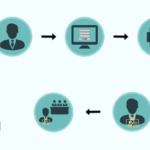In today’s complex workplace environment, professional staff are expected to adhere to a range of legal and ethical responsibilities.
Understanding these responsibilities is crucial not only for compliance but also for fostering a culture of integrity and accountability within an organization. Here’s a comprehensive overview of the legal and ethical obligations that professional staff must navigate.
Legal Responsibilities
Compliance with Employment Laws
Professional staff must adhere to various employment laws that govern workplace practices. This includes:
- Fair Labor Standards Act (FLSA): Ensures proper wage and hour practices, including minimum wage, overtime pay, and record-keeping.
- Equal Employment Opportunity (EEO) Laws: Prohibit discrimination based on race, color, religion, sex, national origin, age, disability, and genetic information.
Adherence to Safety Regulations
Organizations must comply with safety regulations to protect employees and customers. This includes:
- Occupational Safety and Health Administration (OSHA) Standards: Ensure a safe working environment by addressing potential hazards and implementing safety protocols.
- Reporting and Responding to Unsafe Conditions: Staff are obligated to report any safety concerns and participate in safety training and drills.
Data Protection and Privacy Laws
With the increasing reliance on technology, professional staff must understand their obligations regarding data protection:
- General Data Protection Regulation (GDPR): For organizations operating in or dealing with individuals in the EU, compliance with GDPR is essential for data privacy and protection.
- Health Insurance Portability and Accountability Act (HIPAA): For healthcare professionals, protecting patient information is a legal requirement.
Intellectual Property Rights
Respecting intellectual property rights is crucial to prevent legal issues. This includes:
- Copyrights, Trademarks, and Patents: Staff must understand the implications of using protected material and ensure that their work does not infringe on others’ intellectual property.
Ethical Responsibilities
1. Integrity and Honesty
Professional staff are expected to conduct themselves with integrity. This involves:
- Transparency: Being honest in communications and disclosures, both internally and externally.
- Avoiding Misrepresentation: Ensuring that all information provided to clients, colleagues, and stakeholders is accurate and truthful.
2. Confidentiality
Maintaining confidentiality is paramount in many professional environments:
- Protecting Sensitive Information: Staffing agency must safeguard proprietary information, trade secrets, and client data, ensuring it is not disclosed without proper authorization.
- Respecting Privacy: Understanding the importance of privacy in all interactions, especially when handling personal or sensitive information.
3. Professional Competence
Maintaining high standards of professionalism is essential:
- Continuous Learning: Engaging in ongoing education and training to stay updated with industry standards, best practices, and legal requirements.
- Providing Quality Work: Striving to deliver high-quality service and products that meet or exceed professional standards.
4. Fairness and Respect
The Importance of Fairness
1. Equitable Treatment
Fairness ensures that all employees are treated equally, regardless of their background, status, or personal characteristics. This includes:
- Equal Opportunities: Providing all employees with the same chances for promotions, training, and career advancement.
- Consistent Policies: Applying company policies uniformly to avoid favoritism and bias.
2. Building Trust
When employees perceive that they are treated fairly, it builds trust between staff and management:
- Open Communication: Encouraging transparent communication helps in addressing concerns and misunderstandings promptly.
- Employee Engagement: Fair treatment fosters a sense of belonging and commitment, leading to higher employee engagement and morale.
3. Conflict Reduction
Fairness can significantly reduce conflicts in the workplace:
- Clear Guidelines: Establishing clear guidelines and expectations helps prevent disputes and confusion.
- Mediation: Fairly addressing conflicts through mediation ensures that all parties feel heard and respected.
The Importance of Respect
1. Creating a Positive Work Environment
Respectful interactions contribute to a healthier workplace culture:
- Encouraging Collaboration: When employees respect one another, they are more likely to collaborate effectively and support each other.
- Boosting Morale: A culture of respect enhances job satisfaction and morale, reducing turnover rates.
5. Accountability
Professional staff must take responsibility for their actions:
- Owning Mistakes: Acknowledging errors and taking appropriate corrective actions rather than deflecting blame.
- Reporting Misconduct: Being proactive in reporting unethical behavior or violations of policies, even when it may be uncomfortable.
Conclusion
Understanding and adhering to the legal and ethical responsibilities of professional staff is crucial for creating a trustworthy and compliant workplace. By upholding these obligations, professionals not only protect themselves and their organizations from legal repercussions but also contribute to a positive organizational culture built on integrity and respect. Training and awareness initiatives can help reinforce these responsibilities, ensuring that all staff are equipped to navigate the complexities of their roles with confidence and ethical clarity.

















































